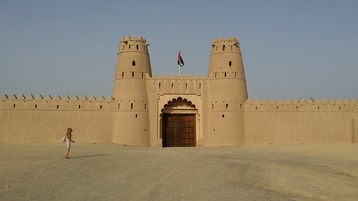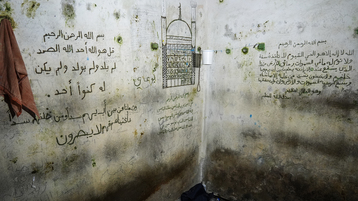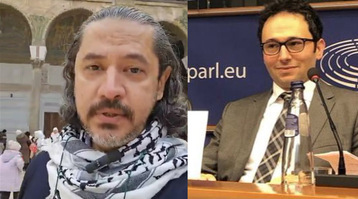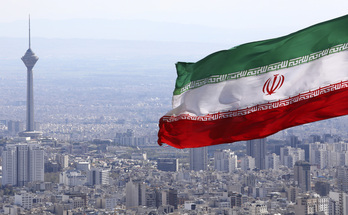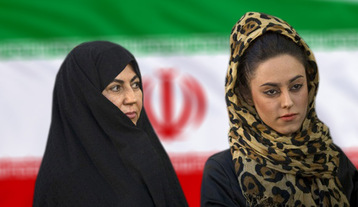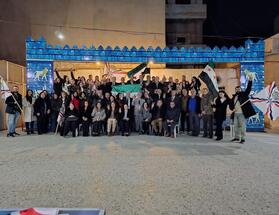-
Iran is a safe haven for Al-Qaeda!

On Tuesday, January 12th, the US Secretary of State, Mike Pompeo, at the National Press Club, released information at this club for Journalists in Washington D. C. about how the Islamic Republic of Iran has provided al-Qaeda with new operations centers. Due to the appeasement policy this information had previously bypassed the press. He described in detail the operation as to how Iran has become a safe haven for al-Qaeda leaders. Documents related to Iran's connection and providing shelter for al-Qaeda leaders have been the subject of international debate for the past two decades.
Over the past two decades, the relationship between the regime and Sunni fundamentalist groups has gone beyond a purely political, financial, and military one, and it has had an ideological factor associated with it. Qassem Soleimani oversaw relations with al-Qaeda. Al-Qaeda military leaders remained in Tehran until 2015, after which Qassem Soleimani sent five of them, including Mohammed Al-Masri, to Damascus on a mission to contact ISIS forces and encourage them to secede from ISIS and join al-Qaeda.
During these years, the Quds Force organized al-Qaeda in Syria using the remnants of ISIS. Qassem Soleimani, commander of the Quds Force under Khamenei, played a key role in coordinating Tehran-al-Qaeda relations and provided shelter for the bin Laden family and senior al-Qaeda commanders in Iran after the organization's defeat in Afghanistan in 2001. Soleimani built a residential complex for them in the heart of an IRGC’s training garrison in Tehran. Last August, Abu Mohammad al-Masri, al-Qaeda's number two figure, was killed in Tehran, which the regime initially denied, but later confirmed.
The support and financing of al-Qaeda by the Mullahs’ regime has played a key role in rebuilding its structure. "According to the US Federal Bureau of Investigation (FBI), this organization had only 400 members during the 9/11 attacks on the Twin Towers and dispersed after the US invasion of Afghanistan, but with the rise of ISIS in 2013, Al-Qaeda, with the pursuit and efforts of Qassem Soleimani, also came to life.”.
Some of the details of Iran's relationship with Al-Qaeda were obtained amid documents collected in the attack on Al-Qaeda's headquarters in Pakistan.
According to one of the documents obtained, “a prominent member of Al-Qaeda wrote in a letter that Iran is ready to provide Al-Qaeda with everything it needs, including property, weapons, and Hezbollah’s training camp in Lebanon, in exchange for Al-Qaeda to attack US interests in the Kingdom of Saudi Arabia and the Gulf region.".
Another document states, “Iranian intelligence agencies have agreed to provide visas and facilities to Al-Qaeda forces and to shelter other Al-Qaeda members.". This was done through talks between the Iranians and Abu Hafs Al-Mauritania, one of the key figures in Al-Qaeda’s 9/11 attacks.
The question is, why does the Iranian regime support Al-Qaeda?
Khamenei's doctrine for his regime’s survival includes two policies: exporting terrorism to provide his regime with defense lines outside Iran’s borders and repression inside to prevent protests and uprisings. IRGC has a primary role in advancing both policies.
The IRGC’s Quds Force has had extensive terrorist interventions in various countries over the past two decades, such as Yemen, Syria, Lebanon, Iraq, and so on. The regime has also set up special units at its embassies in various countries and sent its trained special officers to assassinate dissidents abroad. An example of this is Assadollah Assadi, who, under the guise of a diplomat at the Iranian embassy in Austria, committed covert terrorist acts and was arrested. According to documents from the Belgian court in Antwerp, Assadi was the person who came up with the plot of the bomb transfer to the meeting of the National Council of Resistance of Iran (NCRI).
The Mullahs’ regime’s main concern is its survival and the crises they face for its overthrow. Therefore, the Mullahs need Al-Qaeda terrorist members to survive. And uses them as leverage to extort what they want in their dealings with the world and to interfere in the region.
 Cyrus Yaqubi
Cyrus Yaqubi
* Cyrus Yaqubi is a Research Analyst and Iranian Foreign Affairs Commentator investigating the economy of the Middle east countries that are relying on oil revenue and comparing their progress to their ruling system, especially covering a variety of topics about Iran.
Tags
You May Also Like
Popular Posts
Caricature
BENEFIT AGM approves 10%...
- March 27, 2025
BENEFIT, the Kingdom’s innovator and leading company in Fintech and electronic financial transactions service, held its Annual General Meeting (AGM) at the company’s headquarters in the Seef District.
During the meeting, shareholders approved all items listed on the agenda, including the ratification of the minutes of the previous AGM held on 26 March 2024. The session reviewed and approved the Board’s Annual Report on the company’s activities and financial performance for the fiscal year ended 31 December 2024, and the shareholders expressed their satisfaction with the company’s operational and financial results during the reporting period.
The meeting also reviewed the Independent External Auditor’s Report on the company’s consolidated financial statements for the year ended 31 December 2024. Subsequently, the shareholders approved the audited financial statements for the fiscal year. Based on the Board’s recommendation, the shareholders approved the distribution of a cash dividend equivalent to 10% of the paid-up share capital.
Furthermore, the shareholders endorsed the allocation of a total amount of BD 172,500 as remuneration to the members of the Board for the year ended 31 December 2024, subject to prior clearance by related authorities.
The extension of the current composition of the Board was approved, which includes ten members and one CBB observer, for a further six-month term, expiring in September 2025, pending no objection from the CBB.
The meeting reviewed and approved the Corporate Governance Report for 2024, which affirmed the company’s full compliance with the corporate governance directives issued by the CBB and other applicable regulatory frameworks. The AGM absolved the Board Members of liability for any of their actions during the year ending on 31st December 2024, in accordance with the Commercial Companies Law.
In alignment with regulatory requirements, the session approved the reappointment of Ernst & Young (EY) as the company’s External Auditors for the fiscal year 2025, covering both the parent company and its subsidiaries—Sinnad and Bahrain FinTech Bay. The Board was authorised to determine the external auditors’ professional fees, subject to approval from the CBB, and the meeting concluded with a discussion of any additional issues as per Article (207) of the Commercial Companies Law.
Speaking on the company’s performance, Mr. Mohamed Al Bastaki, Chairman BENEFIT , stated: “In terms of the financial results for 2024, I am pleased to say that the year gone by has also been proved to be a success in delivering tangible results. Growth rate for 2024 was 19 per cent. Revenue for the year was BD 17 M (US$ 45.3 Million) and net profit was 2 Million ($ 5.3 Million).
Mr. Al Bastaki also announced that the Board had formally adopted a new three-year strategic roadmap to commence in 2025. The strategy encompasses a phased international expansion, optimisation of internal operations, enhanced revenue diversification, long-term sustainability initiatives, and the advancement of innovation and digital transformation initiatives across all service lines.
“I extend my sincere appreciation to the CBB for its continued support of BENEFIT and its pivotal role in fostering a stable and progressive regulatory environment for the Kingdom’s banking and financial sector—an environment that has significantly reinforced Bahrain’s standing as a leading financial hub in the region,” said Mr. Al Bastaki. “I would also like to thank our partner banks and valued customers for their trust, and our shareholders for their ongoing encouragement. The achievements of 2024 set a strong precedent, and I am confident they will serve as a foundation for yet another successful and impactful year ahead.”
Chief Executive of BENEFIT; Mr. Abdulwahed AlJanahi commented, “The year 2024 represented another pivotal chapter in BENEFIT ’s evolution. We achieved substantial progress in advancing our digital strategy across multiple sectors, while reinforcing our long-term commitment to the development of Bahrain’s financial services and payments landscape. Throughout the year, we remained firmly aligned with our objective of delivering measurable value to our shareholders, strategic partners, and customers. At the same time, we continued to play an active role in enabling Bahrain’s digital economy by introducing innovative solutions and service enhancements that directly address market needs and future opportunities.”
Mr. AlJanahi affirmed that BENEFIT has successfully developed a robust and well-integrated payment network that connects individuals and businesses across Bahrain, accelerating the adoption of emerging technologies in the banking and financial services sector and reinforcing Bahrain’s position as a growing fintech hub, and added, “Our achievements of the past year reflect a long-term vision to establish a resilient electronic payment infrastructure that supports the Kingdom’s digital economy. Key developments in 2024 included the implementation of central authentication for open banking via BENEFIT Pay”
Mr. AlJanahi concluded by thanking the Board for its strategic direction, the company’s staff for their continued dedication, and the Central Bank of Bahrain, member banks, and shareholders for their valuable partnership and confidence in the company’s long-term vision.
opinion
Report
ads
Newsletter
Subscribe to our mailing list to get the new updates!

